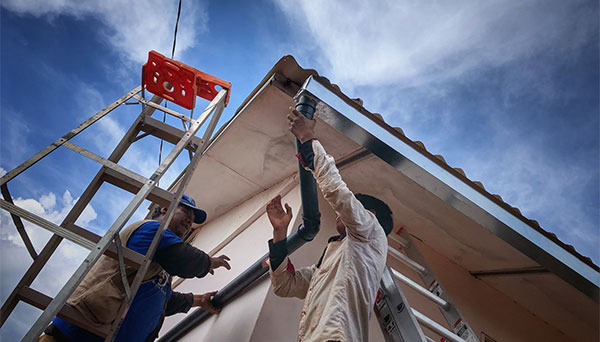One Water: An Indigenous-led Process to Increase Water Resilience for First Nations in Ontario through Rain Water Harvesting
Organization: Isla Urbana
Mission: To ensure a future where everyone has access to clean water by safeguarding the best options available for Rain Water Harvesting and its integrated management.
Location: Nipissing First Nation, Canada, and Oaxaca, Jalisco, Chihuahua, Mexico
Country: Canada, Mexico
Other Organizations Involved: Nipissing First Nation; Wixárika- Jalisco, Mazateca-Oaxaca and Rarámuri-Chihuahuan communities; Canadian Shield Consultants; University of Toronto’s Center for Global Engineering.
 @ Liseth Machorro, Ha Ta Tukari - Isla Urbana
@ Liseth Machorro, Ha Ta Tukari - Isla Urbana
Background
Indigenous communities in Canada have struggled with access to safe drinking water for decades. Infrastructure deficit, pollution of water sources and lack of trained personnel are some of the causes. Climate change aggravates the situation as warmer temperatures alter the water cycle and create favorable conditions for threats such as blue-green algae. It also increases the risk of infrastructure failures (e.g., power outages) associated with extreme weather events.
First Nations communities issue Drinking Water Advisories (DWAs) to warn people to not drink water that may be unsafe. As of October 2022, there were 22 long-term (lasting one year or longer) DWAs and 13 short-term (under one year) DWAs in Ontario, the largest number of all the provinces. Multiple long-term DWAs have been lifted since 2015 thanks to investment in infrastructure but the lack of resilience in water infrastructure and the risk of contamination lead to new DWAs and recurrent short-term DWAs every year.
Goals
- Increase water availability and water infrastructure resilience for First Nation communities in Ontario through Rain Water Harvesting (RWH);
- Build local community capacity around RWH;
- Increase RWH adoption among First Nation communities in Ontario; and
- Strengthen ties among international and interdisciplinary communities around water resilience strategies across North America.
Main activities
- Phase 1: "We are Water." Community relationships with water, stories and asset mapping, technical analysis are conducted. Nipissing First Nation delegation visits Mexican projects. Some 60 community members are involved. One toolkit and video are created, which summarize the phase.
- Phase 2: "Possibilities." Community visioning is conducted, with climate and water scenarios and alternatives to address them. 75 community members are involved. One toolkit and video are produced.
- Phase 3: "Making it happen." Site-specific technical solutions involving rainwater harvesting are defined, an implementation plan is produced and implemented (including detailed design and permits). Three rainwater harvesting systems are installed in libraries, schools, community centers or households of Nipissing First Nation and surrounding First Nations communities in Ontario. The Mexican delegation visits Ontario’s First Nation project, and some 180 community members are involved. One toolkit and video are produced.
- Phase 4: "Keep it up, learn and share." Operation and maintenance of rainwater harvesting systems, water quality testing are in place and knowledge has been disseminated. 250 community members were involved. One toolkit and video are produced. Eighteen people are trained in operation and maintenance of systems.
Outcomes
- Selected buildings at First Nation communities have increased water availability and resilience;
- WRH members and communities gain a mutual understanding of the current water situation, climate change scenarios, RWH solutions and their operation and maintenance;
- Additional RWH projects are initiated by other communities; and
- Nation-to-Nation relationships are created to inform other RWH projects and water-resilience initiatives.